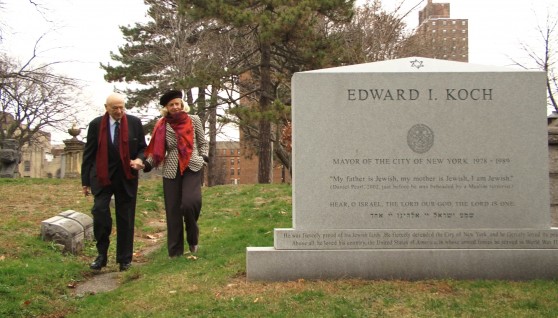Koch: More lights on the bridge

Photo: Zeitgeist Film
I grew up in a Wall Street bedroom community, where the local news isn’t really local because…who cares.
The local news is New York City’s news, and those stories the ones Law & Order ripped from the headlines, dominated my childhood. New York City’s mayors, too. Our mayor was just a guy; being mayor wasn’t his full-time gig. He just walked around and bought bread like the rest of us. Being mayor of New York City is like governing a star by comparison, the size of it, all the chemical processes inside it.
Koch reminded me of that feeling from childhood of orbiting that dark star 30 miles away. He was at the center of all those stories, but when you’re a kid, you have your own headlines, and I knew the names from Koch’s tenure — the fight over Sydenham hospital; Donald Manes; Mayor: The Musical — but I’d never gotten into the details before. Koch is evocatively filmed and scored, a pleasant hour and a half with a historical figure of my youth, but it doesn’t really get into those details either, and that’s its problem. Filmmaker Neil Barsky (Knuckleball!, another docu I was merely whelmed by) seems to have determined to stick with a year-by-year accounting of the biggest stories in Koch’s dozen-year tenure as Hizzoner, intercut with present-day footage of the now-beloved pol kibitzing with family and getting a bridge named after him. It isn’t a bad structuring idea in its inception, and Barsky is deft at covering a lot of material without rushing.
But the film spends time on Koch’s service in Congress, and Koch visiting his own tombstone, already carved (with a birth-date error, which we don’t see him noticing), and Koch wandering around Andrew Cuomo’s campaign headquarters on election night and muttering that he’s a “schmuck,” that it might have better spent focusing on just one of the battles Koch faced in office: his (non-)handling of the AIDS crisis, or the Donald Manes thing. I mean, Manes stabbed himself in the chest, to death. I never knew that. I never knew that whole parking-bureau story; for someone my age, who knows a lot of these names on a DNA level from hearing Sue Simmons and Bill Beutel utter them over and over on the little countertop TV while we did homework in the kitchen, a movie like, say, Koch: Three Fights might have worked better.
This movie is fine. Barsky uses a lot of nifty footage, like Koch campaigning at the subway entrance with a little amp while a guy in a Koch muscle shirt holds an umbrella impassively over the candidate’s head, or the subway doors closing to reveal a graffito of Ronald McDonald. It’s like visiting an old friend, and Reverend Butts’s assessment of the various mayors of NYC since Beame and their relationship to the job and the city is a great closer. Barsky has one scene in the present day with Koch getting made up, eyes closed, for a spot on NY1, while a VO discusses the corruption scandal’s effects on Koch’s ability to govern, and the effect, that of a dead man getting prepped for his coffin, is creepy. But then Barsky dithers around on the election, on Yom Kippur with family, on an arty shot of Koch entering his apartment at the end of a long hall, going inside, and shutting the door on us in the dark. As an ending, it’s too hokey to work in a non-fiction film, and it’s not even the ending. Koch is a difficult subject to get arms entirely around, and Barsky doesn’t succeed — but thanks to the charisma of the subject, the film more or less does, as a time capsule of sorts. It’s not boring or badly made, and you could do worse than leave your viewers wanting to learn more. Just…maybe not this much more.
Tags: Andrew Cuomo Bill Beutel Calvin Butts Donald Manes Ed Koch Knuckleball! Koch movies Neil Barsky politix Sue Simmons





